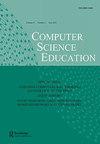培养计算机专业转学生的博士抱负
IF 2.2
Q1 EDUCATION & EDUCATIONAL RESEARCH
引用次数: 4
摘要
从社区大学转学到四年制学位的学生(即向上转学的学生)代表了一个多元化和有才华的群体,对促进STEM领域的性别平等至关重要。然而,研究尚未探索促进计算机专业学生攻读博士学位的因素,导致错过了支持这一独特群体的机会。目的研究计算机专业学生攻读博士学位愿望的预测因素,重点研究这些模式在女性攻读博士学位时的独特之处。方法基于来自15所研究型大学的向上转校生的纵向调查数据,我们使用具有交互项的逻辑回归来确定博士愿望的预测因素。我们发现,攻读博士学位的愿望在向上转移的女性中尤为频繁,其中14%的人渴望获得博士学位。其他结果强调了教师鼓励研究生学习在预测所有向上转移的学生的博士愿望方面的重要性。除了这种教员鼓励的直接作用外,人们对计算机教员的看法也能独特地预测女性升学博士的愿望。我们的研究结果为如何支持更公平地获得教师指导,在整个转学过程中支持学生,以及制定影响学生对学术界看法的包容性教师政策提供了见解。本文章由计算机程序翻译,如有差异,请以英文原文为准。
Fostering Ph.D. aspirations among upward transfer students in computing
ABSTRACT Background Students who transfer from community colleges in pursuit of four-year degrees (i.e., upward transfer students) represent a diverse and talented group that is critical to advancing gender equity in STEM. However, research has not yet explored factors that promote Ph.D. aspirations among upward transfer computing students, resulting in missed opportunities to support this unique group. Objective We examine the predictors of upward transfer computing students’ Ph.D. aspirations, focusing on how these patterns might be unique for upward transfer women. Method Relying on longitudinal survey data from upward transfer students across 15 research universities, we use logistic regression with interaction terms to identify the predictors of Ph.D. aspirations. Findings We found that Ph.D. aspirations were especially frequent among upward transfer women, 14% of whom aspired to earn a Ph.D. Other results highlight the importance of faculty encouragement for graduate study in predicting all upward transfer students’ Ph.D. aspirations. Beyond the direct role of such faculty encouragement, perceptions of computing faculty uniquely predicted Ph.D. aspirations for upward transfer women. Implications Our findings provide insight into how to bolster more equitable access to faculty mentorship, support students throughout the transfer process, and create inclusive faculty policies, which impact students’ perceptions of academia.
求助全文
通过发布文献求助,成功后即可免费获取论文全文。
去求助
来源期刊

Computer Science Education
EDUCATION & EDUCATIONAL RESEARCH-
CiteScore
6.90
自引率
3.70%
发文量
23
期刊介绍:
Computer Science Education publishes high-quality papers with a specific focus on teaching and learning within the computing discipline. The journal seeks novel contributions that are accessible and of interest to researchers and practitioners alike. We invite work with learners of all ages and across both classroom and out-of-classroom learning contexts.
 求助内容:
求助内容: 应助结果提醒方式:
应助结果提醒方式:


